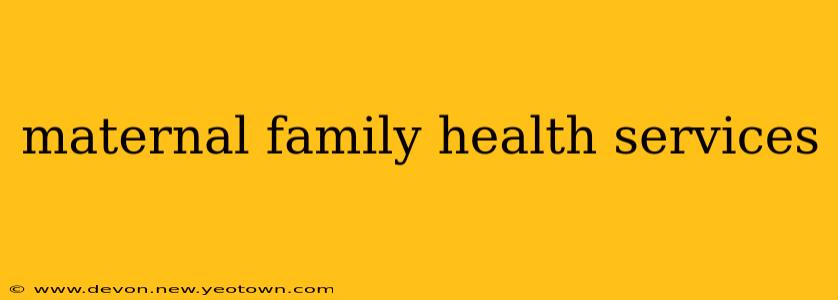Navigating pregnancy and the postpartum period can be a rollercoaster of emotions and challenges. For many, it's a joyous journey, but it's also a time of significant physical and mental change, demanding comprehensive support. This is where maternal family health services step in, providing crucial care not just for the mother but for the entire family unit. This isn't just about checkups and vaccinations; it's about building a strong foundation for a healthy family.
What are Maternal Family Health Services?
Maternal family health services encompass a broad range of interventions and support designed to improve the health and well-being of pregnant women, new mothers, and their families. These services aim to prevent complications, promote healthy behaviors, and facilitate a smooth transition into parenthood. Think of it as a holistic approach, addressing the physical, mental, and emotional needs of everyone involved. It's a safety net, ensuring that families receive the necessary support during this transformative period.
What Services are Typically Included?
The specifics of maternal family health services can vary depending on location and healthcare systems, but many programs offer a combination of the following:
- Prenatal Care: Regular checkups throughout pregnancy to monitor the mother's and baby's health, including screenings for potential complications.
- Labor and Delivery Services: Support during childbirth, from pain management to assistance with breastfeeding.
- Postnatal Care: Checkups after delivery to monitor the mother's recovery and address any postpartum complications.
- Infant Care: Newborn screenings, vaccinations, and well-baby visits to ensure the infant's healthy development.
- Family Planning: Counseling and access to contraception to help families plan their pregnancies.
- Lactation Support: Assistance with breastfeeding, including education and troubleshooting common challenges.
- Mental Health Services: Addressing the mental health needs of both the mother and father, including support for postpartum depression and anxiety.
- Nutritional Counseling: Guidance on healthy eating habits during pregnancy and breastfeeding.
- Social Services: Connecting families with resources such as housing assistance, food banks, and childcare.
What are the Benefits of Maternal Family Health Services?
The benefits extend far beyond the immediate postpartum period. Early intervention and ongoing support significantly reduce the risks of complications for both mother and baby. These services can:
- Reduce maternal mortality and morbidity: Early detection and management of pregnancy-related complications can save lives.
- Improve infant health and development: Regular checkups and vaccinations protect infants from illness and ensure healthy growth.
- Strengthen family bonds: Support services can help families navigate the challenges of parenthood, strengthening their relationships.
- Reduce healthcare costs: Preventing complications can significantly reduce the need for expensive medical interventions later on.
How can I access Maternal Family Health Services?
Accessing these vital services often involves contacting your primary care physician, obstetrician, or local health department. Many communities offer free or low-cost programs specifically designed to support pregnant women and new mothers. Don't hesitate to reach out – information is readily available, and the support is invaluable.
How do Maternal Family Health Services improve family well-being?
Maternal family health services contribute to family well-being by providing a holistic approach that encompasses physical, mental, and social support. By addressing the needs of the entire family, these services foster stronger family bonds, improved communication, and a greater sense of well-being. Early identification and intervention for potential problems strengthens the family unit and sets the stage for healthier lives for all family members.
Are there specific programs for underserved communities?
Yes, many programs specifically target underserved communities to overcome barriers to accessing healthcare. These programs often offer culturally competent services, language translation, transportation assistance, and other support systems to ensure equitable access to care. The goal is to reach all families, regardless of their background or socioeconomic status.
What if I can't afford Maternal Family Health Services?
Financial constraints shouldn't prevent access to essential care. Many government-funded and non-profit organizations offer subsidized or free services for pregnant women and new mothers who qualify based on income or other factors. It's crucial to inquire about financial assistance programs available in your area.
In conclusion, maternal family health services are an invaluable resource for families embarking on the journey of parenthood. These comprehensive services provide crucial support throughout pregnancy, childbirth, and the postpartum period, contributing to healthier mothers, healthier babies, and stronger families. Don't hesitate to seek out these services – your well-being and the well-being of your family are worth it.

